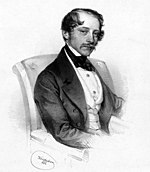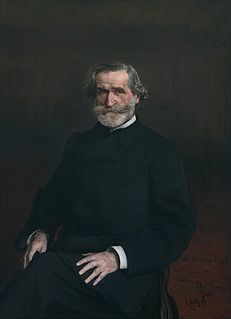
Giuseppe Fortunino Francesco Verdi was an Italian composer best known for his operas. He was born near Busseto to a provincial family of moderate means, receiving a musical education with the help of a local patron. Verdi came to dominate the Italian opera scene after the era of Gioachino Rossini, Gaetano Donizetti, and Vincenzo Bellini, whose works significantly influenced him.

Ernani is an operatic dramma lirico in four acts by Giuseppe Verdi to an Italian libretto by Francesco Maria Piave, based on the 1830 play Hernani by Victor Hugo.
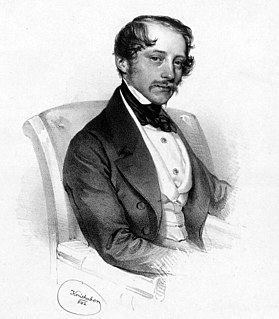
Carl Otto Ehrenfried Nicolai was a German composer, conductor, and one of the founders of the Vienna Philharmonic. Nicolai is best known for his operatic version of Shakespeare's comedy The Merry Wives of Windsor as Die lustigen Weiber von Windsor. In addition to five operas, Nicolai composed lieder, works for orchestra, chorus, ensemble, and solo instruments.

Giuseppe Felice Romani was an Italian poet and scholar of literature and mythology who wrote many librettos for the opera composers Donizetti and Bellini. Romani was considered the finest Italian librettist between Metastasio and Boito.
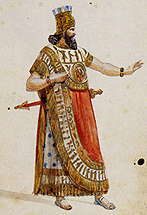
Nabucco is an Italian-language opera in four acts composed in 1841 by Giuseppe Verdi to an Italian libretto by Temistocle Solera. The libretto is based on the biblical books of 2 Kings, Jeremiah, Lamentations and Daniel and the 1836 play by Auguste Anicet-Bourgeois and Francis Cornu. However, Antonio Cortese's ballet adaptation of the play, given at La Scala in 1836, was a more important source for Solera than the play itself. Under its original name of Nabucodonosor, the opera was first performed at La Scala in Milan on 9 March 1842.

Grand opera is a genre of 19th-century opera generally in four or five acts, characterized by large-scale casts and orchestras, and lavish and spectacular design and stage effects, normally with plots based on or around dramatic historic events. The term is particularly applied to certain productions of the Paris Opéra from the late 1820s to around 1850; 'grand opéra' has sometimes been used to denote the Paris Opéra itself.

Un giorno di regno, ossia Il finto Stanislao is an operatic melodramma giocoso in two acts by Giuseppe Verdi to an Italian libretto written in 1818 by Felice Romani. Originally written for the Bohemian composer Adalbert Gyrowetz the libretto was based on the play Le faux Stanislas written by the Frenchman Alexandre-Vincent Pineux Duval in 1808. Un giorno was given its premiere performance at the Teatro alla Scala, Milan on 5 September 1840.

Salvadore Cammarano was a prolific Italian librettist and playwright perhaps best known for writing the text of Lucia di Lammermoor (1835) for Gaetano Donizetti.

The Teatro Lirico Giuseppe Verdi is an opera house located in Trieste, Italy and named after the composer Giuseppe Verdi. Privately constructed, it was inaugurated as the Teatro Nuovo to replace the smaller 800-seat "Cesareo Regio Teatro di San Pietro" on 21 April 1801 with a performance of Johann Simon Mayr's Ginevra di Scozia. Initially, the Nuovo had 1,400 seats. In 1821, it became known as the Teatro Grande.

L'esule di Roma, ossia Il proscritto is a melodramma eroico, or heroic opera, in two acts by Gaetano Donizetti. Domenico Gilardoni wrote the Italian libretto after Luigi Marchionni's Il proscritto romano, in its turn based on Louis-Charles Caigniez and Debotière's Androclès ou Le lion reconnaissant. It premiered on 1 January 1828 at the Teatro San Carlo, Naples.

Theater am Kärntnertor or Kärntnertortheater was a prestigious theatre in Vienna during the eighteenth and nineteenth centuries. Its official title was Kaiserliches und Königliches Hoftheater zu Wien.
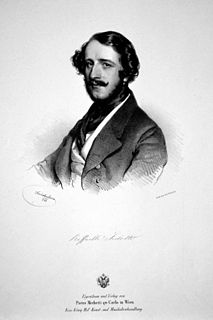
Raffaele Ferlotti was an Italian operatic baritone who had an active international career from the 1830s through the 1860s. He was a regular performer in Italy's leading opera houses, especially La Scala, and created roles in several world premieres. On the international stage he performed in operas in Austria, England, France, and Spain.
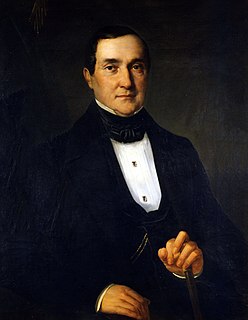
Bartolomeo Merelli was an Italian impresario and librettist, best known as the manager of the La Scala Milan opera house between 1829 and 1850, and for his support for the young Giuseppe Verdi.

Il templario is an Italian-language opera by the German composer Otto Nicolai from a libretto written by Girolamo Maria Marini based on Walter Scott's 1819 novel Ivanhoe.

Filippo Andrea Francesco Coletti was an Italian baritone associated with Giuseppe Verdi. Coletti created two Verdi roles: Gusmano in Alzira and Francesco in I masnadieri. Verdi revised the role of Germont in La traviata for Coletti, whose interpretation re-defined the role as it is known today. Coletti was, with Antonio Tamburini (1800–1876) and Giorgio Ronconi (1810–1890), one of the three leading baritones of 19th century Italy, an early model of a 'Verdi baritone'.
Mario Aspa was an Italian composer. He composed over 40 operas, the most successful of which were Paolo e Virginia and II Muratore di Napoli. He also composed two ballets and a Requiem Mass which was performed on the death of Vittorio Emmanuele II in 1878.
Philipp Kochheim is a German theatre director, author and scenic designer. He also wrote the libretto for the opera Kniefall von Warschau named after Willy Brandt's genuflexion in Warsaw on 7 December 1970, with music by Gerhard Rosenfeld), which premiered in 1997 in the Opernhaus Dortmund, directed by John Dew.
Michael Wittmann is a German musicologist.

Vittorio Gnecchi (1876-1954) was an Italian composer.
